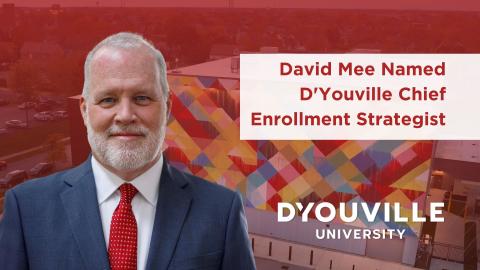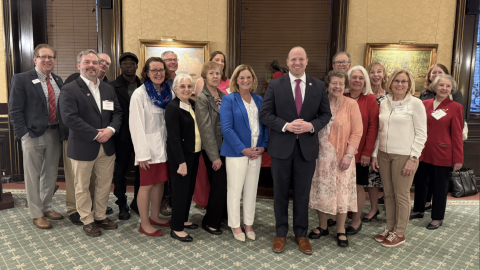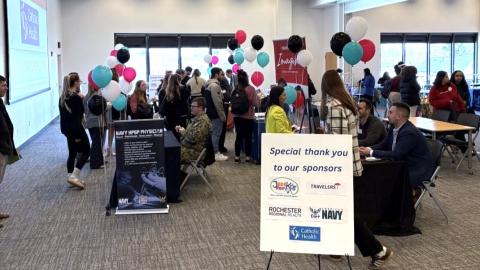
It’s time to fill out your FAFSA for 2025-2026! D’Youville School Code 002712.
Natural Sciences and Mathematics
Studying natural sciences and mathematics opens the door to an abundance of rewarding career opportunities.
Why Choose D'Youville?
- Learn from highly qualified faculty – our full-time faculty have earned a PhD in their field. Their research interests include anatomy, cell biology, neurobiology, ecology, evolution, microbiology, animal behavior, organic and inorganic chemistry, mathematics, and the scholarship of teaching and learning (SoTL), among others.
- Get individualized attention in small classes, usually around 15-30 students. Science labs generally range from 12 to 18 students per class.
- Don't worry if you aren't sure about your career path. Academic advisors will help you choose your courses, and faculty will help you explore career possibilities.
- Gain experience working in our math and science labs. Students can use our labs designated for Gross Anatomy, Cellular and Molecular Biology Research, Chemistry Research, and more.
- D'Youville's long commitment to a liberal arts education means that you'll receive the kind of interdisciplinary education that will give you a rock-solid foundation. Gain skills like problem-solving, critical thinking, collaboration, and written, and oral communication — all skills that employers believe are critical to success, no matter what career path you decide to take.

FOUR-YEAR BACHELOR'S DEGREE
SEQUENTIAL DEGREE
MINORS
Our online application is free and easy to submit.
Mission
The community of scholars that comprises the faculty of the Department of Natural Sciences and Mathematics is committed to excellence in teaching, learning, and research.
We encourage scholarship, skeptical inquiry, and the free exchange of ideas within our department and in the classroom and laboratory, and promote the application of this knowledge beyond those settings. We seek to foster these principles in every one of our students, regardless of their academic backgrounds, in ways that can both be measured and defy measurement.
Our vision of a well educated graduate of our school is a person who has an integrated view of science, who understands the interrelationship between content and process in science, and who has a clear vision of the relationship between science and the ethical, political, and philosophical universe in which he or she lives out his or her life.
Service
The department provides service to D'Youville and to its students in several areas:
- Courses and enrichment for students majoring in science and mathematics
- Support courses for students majoring in healthcare
- Core courses in science, mathematics, and computer science for all students
- Research opportunities in the sciences for all students
- Professional advisement, preparation, and support for students intending to pursue post-graduate education in science, medicine, dentistry, and other related fields.
While the demands of these disparate obligations require targeted responses, the department maintains a coherent set of core values and a clear vision of the relation of its activities to the larger issues that face our society which inform and direct its conduct of all its affairs.
The department seeks to educate scientifically and mathematically literate members of society. We want our students to be able both to apply the education they receive to their own careers and to utilize it as constructive members of their community and participants in our democratic society. Accordingly, we provide the scientific underpinnings for majors in science, technology, and the health professions. But we also provide a component of education that does not depend on a student's major so that they can contribute intelligently to the discussions and decision making that characterize our scientific and technological age. We strive to provide this component in a manner that equips our students, regardless of the venue in which we interact with them, with the scientific and analytical tools they need to continue to develop in a world of rapid technological change.
Principles
- Ideas have primacy over information.
- Education has primacy over training.
- An appreciation of the scientific process has primacy over the mere accumulation of factual knowledge.
- Freedom of inquiry is the core value that makes it possible for us to understand our world and have a positive impact upon our society.
- Our ideas about science should be communicated to others.
- Science is integrative; nature does not respect the divisions between academic disciplines, and the scientific habit of thought influences our relationship with areas of knowledge outside the sciences.
To further these principles, we engage in concrete and directed practices.
We teach our courses using curricula and methods and emphasize core scientific ideas. We teach science as though it were a liberal art, routinely examining the interplay between science, mathematics, and society; and we review in our courses the historical interplay of people and ideas that has led to the worldwide spread of the scientific model.
Pedagogy
Our pedagogy is devoted to how best introduce students to ideas rather than to a particular technology or set of competencies. We educate our students in a way that liberates them from a dependence on narrow technological or procedural rules, and provides them with independent habits of thought, so that they can expand their knowledge to accommodate the changing landscape of scientific knowledge that will shape the world they encounter in the future.
Our classes, laboratories, and research efforts are constructed to foster a brave and experimental attitude in our students. We insist that students experience the process by which scientific knowledge is advanced, and, to the extent that this is possible in undergraduate education, we incorporate this kind of experience into our courses, labs, and research efforts.
We encourage our students to rationally critique what they learn. We subscribe to the maxims that, in science, there is no final authority, and that the debate of scientific truth never ends. Although all of our educational experiences are laden with content, we recognize and communicate to our students the core insight that this content is continuously under review consequently, we encourage and expect skepticism and intellectual honesty in the acquisition of scientific knowledge, and in the confrontation with, and evaluation of all claims to scientific truth.
We require written and oral self-expression in all our educational activities, and we teach our students to express themselves and defend their positions with rational, organized, and civil argumentation.
Explore the degrees offered at D'Youville. Find a program that will lead to your success in the classroom and after graduation.
Visit to learn more about our exceptional academic programs. Take a campus tour and meet faculty and students. Maybe sit in on a class.
With our centrally-located student centers, answers are always nearby — whether you're ready to enroll are about to enter your career.



